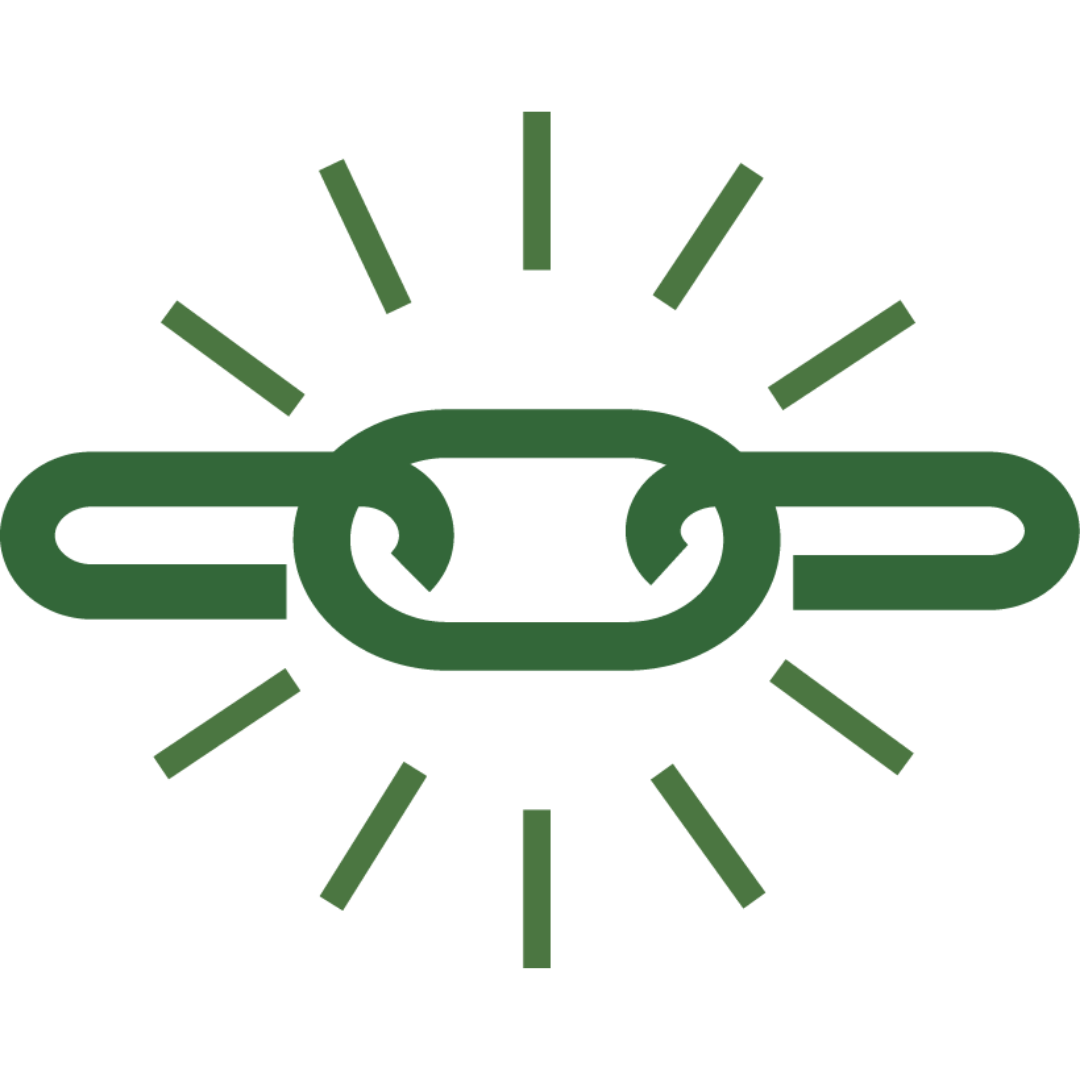Your Fitbit sucks.
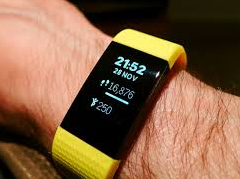
Okay, that’s a little harsh. Let’s tone it down a bit and just say that your Fitbit is leaving a bit to desire – especially when you compare it to some of the other technologies on the market.
What do you use your Fitbit for? I’ve asked this to many users of the fancy bands and they simply say,
I track my steps.
That’s it.
Which leaves me thinking that these people spent ten times the money for a glorified step tracker. You know that, if you simply want to track your steps, you can buy a tracker from Amazon for just $10?
If you’re going to fork out the cash, you may as well get something that you’ll use for more than just tracking your steps.
But, before we get into better Fitbit alternatives, let’s address the problem.
You need to move your body.
You may have heard that sitting is the new smoking. That’s obviously not the best comparison to make but the point is clear: You likely live a sedentary lifestyle and could use a bit more movement throughout your day.
You see, as a human being, you weren’t meant to be sitting (or even standing, for that matter) in the same place for extended periods of time. Our biology is wired for frequent movement.
We often think and say that we need to exercise more. But then we all have different ideas as to what is meant by exercise.
Too often we think of exercise as this major thing in which we have to put on the right clothes and gear, go to this specific place (like the gym) and at the right time of the day. If all of these things aren’t just right it becomes easy for you to skip it.
Now you’ve spent the entire day sitting at your computer and missed your window of opportunity to get in your exercise.
So, if you have a step counter, at least you can see how much time you spend walking around. This is a big step (pun intended!) in the right direction.
Exercise and movement are important but that’s just part of the bigger picture. If your goal is to improve your overall health then you probably need to do more than simply focus on moving your body more.
You need to look at things like the amount of rest you get and your levels of stress. That leads us to the next part of the problem.
You need to get sufficient rest.
If you’re focusing solely on the exercise part of the equation, then you may be missing an even more important factor: your recovery. And likely the best and most important time to recover is at night while you sleep.
You see, when you exercise, you are stressing your body. In order to get the benefits from your exercise, you need to allow your body to adequately recover.
So the question becomes:
Are you ready for more exercise – or should you rest?
If you have a good idea of your exercise and rest then you should have a good idea as to whether you need more of one or the other.
And assuming that your fancy fitness tracker is accumulating all of this data, it should be able to help guide you.
This is where your tracking device comes into play and where Fitbit, as well as many other devices, currently fall short.
Your Fitbit sucks at tracking sleep.
At this point you may be protesting, “But my Fitbit does track my sleep!” True, it does give you a measurement for sleep. But just how accurate is that measurement?
Autodetection is based on your movement. When you haven’t moved for about an hour, your tracker assumes that you’re asleep. Additional data—such as the length of time your movements are indicative of sleep behavior (such as rolling over, etc.)—help confirm that you’re asleep. Morning movement tells your tracker that you’re awake. If you’re not moving but not asleep for long periods of time it’s possible for your tracker to falsely record sleep, in which case you can delete the sleep log from your history.
So your Fitbit is essentially tracking your sleep based on movement. Is there a better way? Yes, and the good news for Fitbit fans is:
Your Fitbit is getting better at tracking your sleep.
More specifically:
If you track sleep with Alta HR, Blaze, or Charge 2, Fitbit uses a combination of your movement and heart rate patterns to estimate your sleep stages.
That’s great because your heart rate is a great indicator of not only sleep but also how well you’re recovering from exercise and stress. However it’s still leaving a bit to be desired when it comes to getting the details of sleep.
That’s because wrist-worn activity trackers don’t reliably assess heart rate, as this study shows.
If you want to get accurate predictions around your sleep, exercise and readiness, you need a device that accurately calculates these measures.
You need a device like the Oura ring.
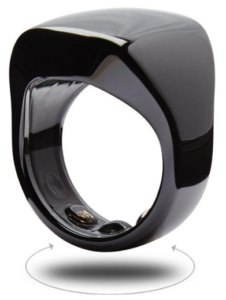
What is the Oura ring – and how is it better at calculating your sleep?
Good questions. The Oura ring is a tracking device that you wear on your finger. Like other tracking devices, it measures movement and heart rate.
But it also measures your body temperature. And the heart rate measurements are likely more accurate than many other devices on the market. This all adds up to better sleep tracking.
In fact, a study was done by the Finnish Institute of Occupational Health that compared the Oura ring to polysomnography studies which record your brain waves, the oxygen level in your blood, heart rate and breathing, as well as eye and leg movements. In their words:
The main finding of this study was that the ŌURA ring was shown to be usable for sleep analysis in the home environment without need for user actions to initiate sleep measurements.
In a sample of fourteen healthy subjects, the ŌURA ring provided unbiased and relevant data on sleep patterns, reaching comparable performance levels to the best scientifically validated alternative methods to Sleep Lab measurements.
Although it’s not the same as an overnight sleep study, consider the benefits. You simply wear the ring on your finger and it does the work every night. I don’t know about you, but I believe that tracking your sleep in the comfort of your own home is a much better option than going to some strange hospital or clinic with all the machines connected.
I imagine by now you’re wondering:
What does the Oura data look like?
Here’s the main dashboard:
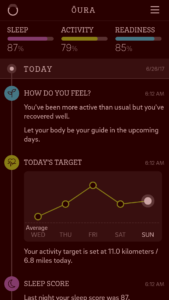
Sleep:
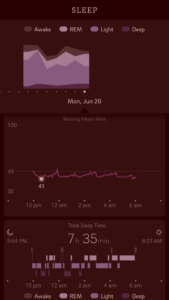
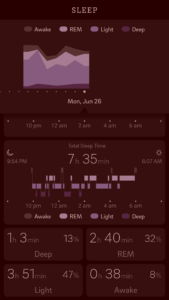
Activity:
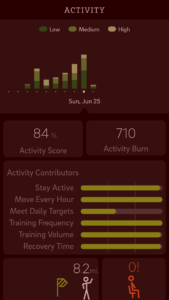
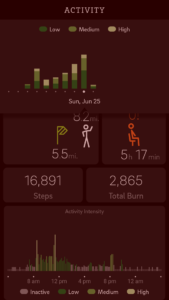
Readiness:
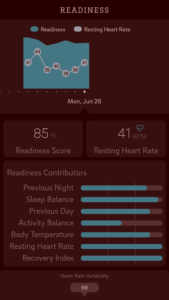
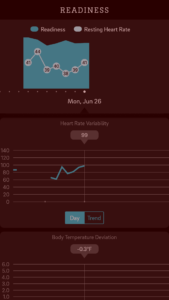
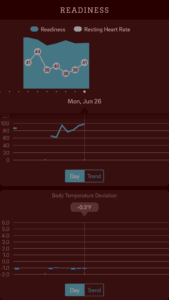
What’s my experience using the Oura ring?
Overall it’s been good. I haven’t used a Fitbit or other similar devices but I have talked to a lot of people who seem to be happy with it.
My key findings:
- Sleep measurements. This is the only device I know of that gives an accurate measurement of the four different sleep stages – including REM sleep – when it works, that is. (See more about this below.)
- Deep sleep. I’ve learned that I rarely get a lot of deep sleep. A good amount of deep sleep for me seems to be an hour. Many nights I only get a few minutes of deep sleep.
- Awake time. I awake several times during the night and seem to spend an hour awake during the night.
- Snoring. Unfortunately Oura doesn’t record this at all. But the app I have on my phone, Sleep as Android, does. Thus I’ve been using my phone to track this at night.
- Battery life. The ring needs to be charged every 1-2 days so I’m now in the habit of charging it before I go to sleep at night.
- Stops recording. Sometimes I’ve noticed that my ring won’t start recording my sleep until a few hours after I’ve gone to bed, which gives me a lot of inaccurate data – especially considering that I get nearly all of my deep sleep during that time. I’ve been back and forth with Oura about it and my takeaway is that perhaps my ring isn’t fitting tightly enough. I’ve asked for a new ring but so far they want to keep trying different things to troubleshoot.
I rarely pay much attention to anything else. Every once in a while I’ll look at my activity and steps – especially if someone wants to compare. I have been looking at my HRV more regularly but, seeing my numbers fluctuate so much, I’m not yet sure what to make of it.
As far as the readiness score, I’ve seen warnings on some days where I need to take it easy when I feel just fine, as well as other days when I feel tired and rundown when Oura tells me to go for it.
Thus, despite the cool technology and improvements, it seems that there still is plenty of room to make Oura and the other fitness trackers better.
Back to you:
What tracking devices do you use – and what’s your experience been?
